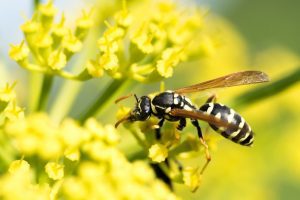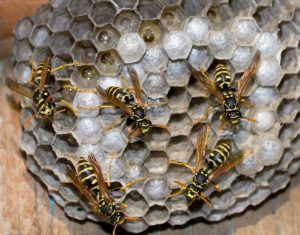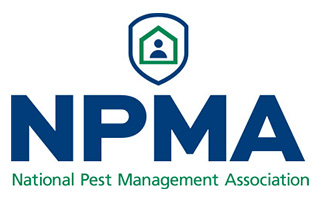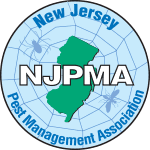WASP CONTROL

Wasps are a very common pest during the summer, especially by the second half of summer and early fall when the colonies are searching for food to sustain their queens during the winter. They are usually more active during the day and return to their nests at dusk. There are 4,000 kinds of wasps that can range from paper wasps, mud wasps, and more in the United States.
Wasps are normally winged with slender and smooth bodies and relatively hairy legs. Their antennae have 12 or 13 segments, and they have biting mouthparts. They are categorized as solitary wasps, which live alone; and social wasps, which live in colonies. Some of them are predatory, while others are parasitic.
Not sure if you have wasps? Or maybe you want to learn more about how wasps control works. Check out the following information to clarify some questions you may have.
Library Shortcuts
- Should I be concerned about Wasps?
- Signs of a Wasp infestation
- Why do I have Wasps?
- Can I remove a Wasp nest myself?
- Tips to prevent Wasps
Should I be concerned about Wasps?
Although wasps can assist in the management of other pests and some of them may function as pollinators, there are some species that are aggressive since they are very territorial and very protective of their young. They become particularly aggressive during the last months of summer. However; these insects are unlikely to sting you unless they feel threatened. If someone or something approaches their nest, wasps will attack to keep the intruder out. They will also attack in packs; wasps and bees release an alarm pheromone that marks their target and alerts the colony to attack. Unlike honey bees, wasps are capable of stinging multiple times. Wasps’ attacks can be dangerous or even deadly, especially for people who are allergic.
Signs of a Wasp infestation
As mentioned before wasps can be a dangerous pest, therefore it is important to be aware of the signs that suggest a wasp infestation. We have listed some of them to help you identify an infestation:
- Wasp swarms; wasps do not swarm in large numbers as termites do, but if you see some wasps in a group around your property, there could be a nest nearby.
- Holes in the walls; wasps can nest in your walls and you may not even notice. Check for holes at unlikely places, like too high or too low. You may even see a few wasps entering and exiting these holes.
- Buzzing noise; wasps are active during the day and can buzz very loudly while building their nest, if you hear crackling sounds in your walls, attic, or rafters, you probably have wasps building a nest in your property.
- Wasp nest; queen wasps build small nests in the spring and lay their first batch of eggs, as soon as the eggs develop into workers, they take over the nest building activities. Wasps’ nests can grow to the size of a basketball or larger, they are usually dull grey or brown in color and are often located in shelter spots with easy access to the outside; like under roof eaves, behind shutters, garages or garden sheds.

Why do I have Wasps?
Wasps are certainly a nuisance to homeowners; the following maybe some of the reasons why you have them in your property:
- • Uncovered food outdoors; wasps look for places where they can hide and have a source of food, if they find an exterior area with uncovered food, they will most likely bill their nest nearby.
- Open trash can lid; another easy access food source for wasps are trash cans, they can find food remnants to feed their young.
- Sweet smelling perfume or lotion; wasps love sweet smelling and will certainly approach someone wearing sweet smelling perfume and lotion.
- Structural damage or entryways; wasps will find any cracks or entries where they can lay their eggs or shelter to overwinter.
- Insect availability; some wasp species feed on insects like larvae and grubs, if there is a good supply of insects they will certainly be on the hunt for them.
Can I remove a Wasp nest myself?
If you are tempted to take down a wasp nest on your own, you’ve probably heard of the following strategies: fire/burning, dish soap, and using a bat. All of these dangerous acts can very easily cause the wasps to swarm and sting you severely. Professional pest control services differ from any DIY treatments because they have access to different tools. For example, wearing bee gear allows technicians to get very close to the nest without the risk of getting stung.

Tips to prevent Wasps
Listed below is a quick prevention guide to help you make your property as unappealing as possible to wasps:
- Caulk any holes found in the foundation and exterior walls of your home.
- Place a tight-fitting cap on all chimneys.
- Remove water sources.
- Place locking lids on all trash cans.
- When eating outdoors, try to keep food covered at all times and clean up all leftover food and drinks.
- Keep tree limbs, bushes, and shrubs a distance away from the outside of your home.
- Locate garden and compost areas a distance away from the outside of your home.
- Do not drink from open beverage cans. Wasps may crawl inside a can attracted by the sweet beverage.
- Avoid sweet-smelling perfumes, hair sprays, colognes, and deodorants.
- Avoid wearing bright-colored clothing.
- Yard work and gardening should be done with caution. Wearing shoes and socks and using work gloves will prevent stings on hands and feet and provide time to get away from an unexpected mound.
*If you have had an allergic reaction to a wasp sting, it’s important that you see an allergist-immunologist.
Want a Free Estimate?
Need to Schedule Service?
Have a Questions?
WHAT WILL WE DO?
Our stinging insects control process typically consists of the following stages:
- Confirm or discard the existence of wasps or nests on the premises through an inspection
- Identify the factors that may be causing and contributing to the infestation
- Offer pest control programs to get the problem under control
- Treat the existing mice population and prevent future infestations
What our clients are saying
Our Partners and Awards
Service area
New Jersey:
Ocean County
Essex County
Passaic County
Morris County
Hudson County
Bergen County









